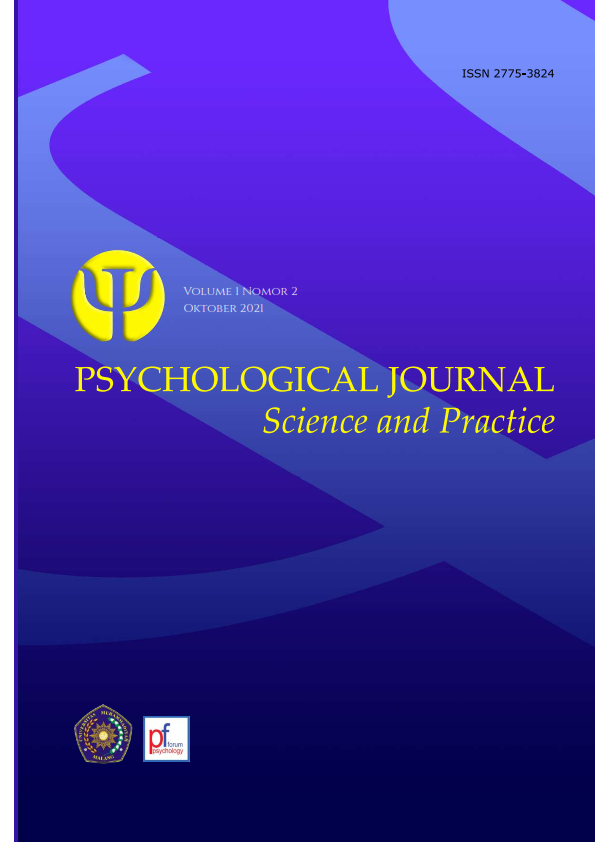Pengaruh internal locus of control terhadap intensi kewirausahaan pada orang Jawa
DOI:
https://doi.org/10.22219/pjsp.v1i2.18189Keywords:
internal locus of control, entrepreneurial intention, cultural, JavaneseAbstract
Cultural influence on entrepreneurship has been an ongoing scientific interest for more than three decades. Indonesia as a multi-cultural country needs to internalize local values in entrepreneurship. One of the internal factors of individuals associated with local values is the internal locus of control in influencing the entrepreneurial intentions possessed by the Javanese. This research examines the influence of culture in entrepreneurship that has not been explored much by psychology research in the field of entrepreneurship. The purpose of this study tested the internal influence of locus of control on entrepreneurial intentions on Javanese. The research method uses a quantitative approach with ex-post facto design, the sample in the study as many as 66 respondents with incidental sampling techniques, instruments used internal locus of control and entrepreneurial intentions, data analysis used is linear regression analysis with a significance level of 0.05. The results of the hypothesis test showed the internal locus of control significantly affected the entrepreneurial intention with a value of p 0.117.
Downloads
References
Adnyana, I. L., & Purnami, N. M. (2016). Pengaruh pendidikan kewirausahaan, self efficacy, locus of control pada niat
berwirausaha. E-Jurnal Manajemen Unud, 5(2), 1160-1188.
Afifah, S. H. (2015). Pengaruh need for achievement dan locus of control terhadap intensi berwirausaha siswa smk negeri 1 surakarta. Digilib UNS.
Agustina, T.S. (2014). Mengungkap perilaku inovatif 3 etnis wanita pedagang di Surabaya. Jurnal Manajemen Teori dan
Terapan. 7(1), 23–37.
Ajzen, I. (1991). The theory of planned behavior. Organizational Behavior and Human Decision Processes, 50(2), 179-211.
https://doi.org/10.1016/0749-5978(91)90020-T
Anthony, S. D. (2015, Februari 25). How singapore became an entrepreneurial hub. Retrieved June 22nd, 2019, from Harvard Business Review:https://hbr.org/2015/02/how-singaporebecame-an-entrepreneurial-hub
As’ad, M. (2003). Psikologi Industri. Liberty, Yogjakarta.
Azwar, S. (2017). Metode peneltian psikologi (2nd ed.). Pustaka Pelajar.
Bao, J., Zhou, X., & Chen, Y. (2017). Entrepreneurial passion and behaviors: opportunity recognition as a mediator. Social
Bevaiour and Personality, 7(45), 1211-1220.https://doi.org/10.2224/sbp.6492
Biraglia, A., & Kadile, V. (2016). The role of entrepreneurial passion and creativity in developing entrepreneurial intentions:
insights from American homebrewers. Journal of Small Business Management, 5(1), 170-188.https://doi.org/10.1111/
jsbm.12242
Bird, B. (1988). Implementing entrepreneurial ideas; the case for intention. Academic of Management Review, 13(3), 442-453.https://doi.org/10.5465/amr.1988.4306970
Carter, S. (2011). The rewards of entrepreneurship: Exploring the incomes, wealth, and economic well-being of entrepreneurial households. Entrepreneurship Theory and Practice, 35(1), 39-55.https://doi.org/10.1111/j.1540-6520.2010.00422.x
Cresswell, J. (2014). Research design qualitative, quantitatif, and mix methods approaches (4th ed.). Sage Publication.
Decker, R., Haltiwanger, J., Jarmin, R., & Miranda, M. (2014). The role of entrepreneurship in us job. Creation and Economic Dynamism, 28(3), 3-24.https://doi.org/10.1257/jep.28.3.3
Depkop. (2017, Mei 19). Kewirausahaan nasional seluruh stakeholder dilibatkan dalam program GKN. Retrieved
Juni 22, 2019, from Kementerian Koperasi dan UKM. http://www.depkop.go.id/read/kewirausahaan-nasionalseluruh-stakeholder-dilibatkan-dalam-program-gkn
Denanyoh, R., Adjei, K., & Nyemekye, G. E. (2015). Factors that impact on entrepreneurial intention of tertiary students in
Ghana. International Journal of Business and Social Research, 5(3), 19-29.https://doi.org/10.18533/ijbsr.v5i3.693
Endraswara, S. (2005). Tradisi Lisan jawa, warisan abadi budaya leluhur. Narasi.
George, G., & Zahra, S. A. (2002). Culture and its consequences for entrepreneurship. Entrepreneurship Theory and Practice, 26(4), 5-9.https://doi.org/10.1177/104225870202600403
Guiso, L., Sapienza, P., & Zingales, L. (2006). Does culture affect economic outcomes?. Journal of Economic Perspective, 20(2), 23-48.https://doi.org/10.1257/jep.20.2.23
Holmgren, C., & From, J. (2005). Taylorism of the mind: Entrepreneurship education from a perspective of educational
research. European Educational Research Journal, 4(4), 382390.https://doi.org/10.2304/eerj.2005.4.4.4
Indarti, N., & Kristiansen, S. (2003). Determinants of entrepreneurial intention the case of norwegian student.
Gadjah Mada International Journal of Business, 5(1), 79-95.https://doi.org/10.22146/gamaijb.5392
Indarti, N., & Rostiani, R. (2008). Intensi kewirausahaan mahasiswa: studi perbandingan antara indonesia, jepang dan
norwegia. Jurnal Ekonomika dan Bisnis Indonesia, 23(4), 127.https://doi.org/10.22146/jieb.6316
Jahani & Efendy, H. (2017). Developing of entrepreneurial spirit in the era of ASEAN economic community in vocational high school. International Journal of Learning and Development, 7(3), 188-209.
Keat, O. Y., Selvarajah, C., & Meyer, D. (2011). Inclination towards entrepreneurship among university students: An
empirical study of Malaysian university students. International Journal of Business and Social Science, 2(4), 206-220.
https://doi.org/10.30845/ijbss
Kementrian Perindustrian. (2012, April). Kemenperin mengembangkan wirausaha baru yang berdaya saing global.
Retrieved from Kementrian Perindustrian Republik Indonesia: http://www.kemenperin.go.id/artikel/3241/kementerianmengembangkan-wirausaha-baru-yang-berdaya-saingglobaltanggal26januari2022
Kriyantono, R. (2014). Teori-teori public relations perspektif barat & lokal: aplikasi penelitian dan praktik. Kencana.
Kristiansen, S., & Indarti, N. (2004). Entrepreneurial intention among indonesian and norwegian students. Journal of
Enterprising Culture, 12(1), 55-78.https://doi.org/10.1142/S021849580400004X
Kutanis, R. O., Mesci, M., & Ovdur, Z. (2011). The effects of locus of control on learning performance: a case of an academic
organization. Journal of Economic and Social Studies, 1(2), 113-136.
Laily, N., & Wahyuni, D. U. (2020). The effects of personality, selfefficacy, and locus of control on the success of javanese female merchants in Surabaya. Indonesian Journal of Business and Entrepreneurship, 6(1), 66–73.https://doi.org/10.17358/ijbe.6.1.66
Margianto, H. (2012, April). Indonesia butuh 4 juta wirausaha. Retrieved Juni 22, 2019, from Kompas.com:
https://money.kompas.com/read/2012/04/29/18332038/Indonesia.Butuh.4.Juta.Wirausaha
Maryati, L., Indriayu, M., & Totalia, S. A. (2017). Pengaruh pengetahuan kwirausahaan dan lingkungan keluarga terhadap
niat berwirausaha siswa di smk negeri 4 surakarta. Skripsi. UNS-FKIP Jurusan Pendidikan Ekonomi.
Matlay, H. (2005). Researching entrepreneurship and education: Part 1: What is entrepreneurship and why does it matter? Education and Training, 47(8), 665-667.
Molino, M., Dolce, V., Cortese, C. G., & Ghislieri, C. (2018). Personality and social support as determinants of entrepreneurial intention.Gender differences in Italy. Plos One, 13(6), 1-19.https://doi.org/10.1371/journal.pone.0199924
Mwakujonga, J., & Sesabo, Y. (2012). Entrepreneurship Education. Saarbrucken, Deutschland: Lap Lambert Academic Publishing.
Obschonka, M., & Stuetzer, M. (2017). Integrating psychological approaches to entrepreneurship: the entrepreneurial personality system (EPS). Small Bus Econ(49), 203-231.https://doi.org/10.1007/s11187-016-9821-y
Ozaralli, N., & Rivenburgh, N. K. (2016). Entrepreneurial intention: antecedents to entrepreneurial behavior in the
U.S.A. and Turkey. Journal of Global Entrepreneurship Research, 6(1), 1-32.https://doi.org/10.1186/s40497-0160047-x
Panggabean, H. (2002). Proses modifikasi kultural pada karakteristik intercultural sensitivity dalam kelompok kerja
Indonesia. Jurnal Psikologi, 14(2), 72-91.
Perwitasari, C. (2017). Pengaruh sikap, norma subyektif, efikasi dan lingkungan keluarga terhadap intesni berwirausaha dengan pendidikan kewirausahaan sebagai variabel intervening pada mahasiswa UMY. UMY Research Respository.
Rai, R. S. (2017). A review on intention models for predicting entrepreneurial behavior. Journal of Entrepreneurship
Education, 20(2), 1-9.
Rauch, A., & Frese, M. (2007). Meta-analysis on the relationship between business owner personality trait, business
creation, and success. European Journal of Work and Organizational Psychology, 16(4).https://doi.org/10.1080/13594320701595438
Remeikiene, R., Startiene, G., & Dumciuviene, D. (2013).Explaining entrepreneurial intention of university students:
the role of entrepreneurial education. Knowledge Management & Innovation, 299-307.
Riyanti, B. P. D. (2010). Kontribusi psikologi dalam penciptaan kewirausahaan di indonesia. Buku pidato pengukuhan guru
besar tetap Universitas Katolik Indonesia Atma Jaya. Jakarta:Penerbit Universitas Atma Jaya.
Riyanti, B. P. D. (2014). Factor influencing the success of creative industry business in Jakarta. Transaksi: Jurnal Bisnis,
Ekonomi, dan Sosial, 6(1), 45-53.
Setiyadi, & Putut, D. (2012). Pemahaman kembali local wisdom etnik jawa dalam tembang macapat dan pemanfaatannya
sebagai media pendidikan budi pekerti bangsa. Magistra, 24(79), 71-76.
Soumyaja, D., & Alexander, L. (2016). A study on the influence of personality traits on entrepreneurial intention among working professionals in the indian technical organizations. Pacific Business Review International, 9(5), 12-19.
Sugiyono. (2016). Metode penelitian kuantitatif, kualitatif, dan R & D. Alfabeta.
Setyorini, T.,D. (2002). Tradisional-non tradisional wanita dan locus of control terhadap motivasi berprestasi pada wanita pedagang batik etnis Jawa, Cina; dan Arab di Pasar Klewer Kotamadya Surakarta. Tesis. Universitas Indonesia
Sujadi, E., & Setioningsih, L. (2018). Perbedaan locus of control ditinjau dari etnis. Jurnal Bimbingan dan Konseling Terapan, 02(02), 128-138.http://dx.doi.org/10.30598/jbkt.v2i2.371
Susanto, S. C. (2017). Pengaruh lingkungan keluarga, pendidikan kewirausahaan, dan efikasi diri terhadap minat berwirausaha mahasiswa. Jurnal Manajemen dan Start-Up Bisnis, 2(3), 277286.
Sumartono. (2009). Sifat, perilaku dan pandangan masyarakat Jawa dalam kehidupan bermasyarakat yang multikultural. Makalah disajikan pada Seminar Internasional PIBSI-XXXI, Universitas Pancasakti Tegal.
Tong, X. F., Tong, D. Y., & Loy, C. L. (2011). Factors influencing entrepreneurial intention among university
students. International Journal of Social Sciences and Humanity Studies, 3(1), 487-496.
Wang, J. H., Chang, C. C., Yao, S. N., & Liang, C. (2016). The contribution of self-efficacy to the relationship between
personality traits and entrepreneurial intention. High Educ(72), 209-224.https://doi.org/10.1007/s10734-015-9946y
Zbierowski, P. (2015). Positive antecedents and consequences of entrepreneurship theoritical considerations. Journal of
positive management, 6(3), 16-28.https://doi.org/10.12775/JPM.2015.013.2

Downloads
Published
How to Cite
Issue
Section
License
Copyright (c) 2022 Moh. Sarifudin S. Auna

This work is licensed under a Creative Commons Attribution-ShareAlike 4.0 International License.
Authors who publish with Psychological Journal: Science and Practice (PJSP) agree to the following terms:
- For all articles published in Psychological Journal: Science and Practice (PJSP), copyright is retained by the authors. Authors give permission to the publisher to announce the work with conditions. When the manuscript is accepted for publication, the authors agree to automatic transfer of the publishing right to the publisher.
- Authors retain copyright and grant the journal right of first publication with the work simultaneously licensed under a Creative Commons Attribution-ShareAlike 4.0 International License that allows others to share the work with an acknowledgment of the work's authorship and initial publication in this journal.
- Authors are able to enter into separate, additional contractual arrangements for the non-exclusive distribution of the journal's published version of the work (e.g., post it to an institutional repository or publish it in a book), with an acknowledgment of its initial publication in this journal.
- Authors are permitted and encouraged to post their work online (e.g., in institutional repositories or on their website) prior to and during the submission process, as it can lead to productive exchanges, as well as earlier and greater citation of published wor (See The Effect of Open Access).
This work is licensed under a Creative Commons Attribution-ShareAlike 4.0 International License.







